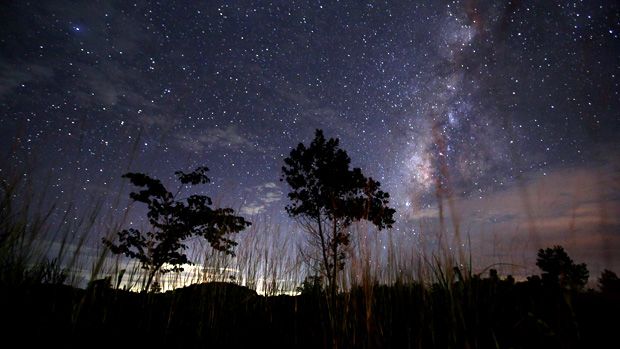Nasa Kepler telescope discovers 715 new planets
Findings represent the 'largest windfall of planets' ever announced – and some may be habitable

A free daily email with the biggest news stories of the day – and the best features from TheWeek.com
You are now subscribed
Your newsletter sign-up was successful
MORE than 700 planets, including four that could possibly be inhabited by humans, have been discovered by scientists searching through data collected by Nasa's Kepler telescope.
The 715 newly discovered planets dotted around the galaxy represent the largest single find in the past 20 years, the BBC reports. In the previous two decades, researchers had detected just over 1,000 new worlds.
"This is the largest windfall of planets that's ever been announced at one time," said Douglas Hudgins from Nasa's astrophysics division.
The Week
Escape your echo chamber. Get the facts behind the news, plus analysis from multiple perspectives.

Sign up for The Week's Free Newsletters
From our morning news briefing to a weekly Good News Newsletter, get the best of The Week delivered directly to your inbox.
From our morning news briefing to a weekly Good News Newsletter, get the best of The Week delivered directly to your inbox.
They orbit 305 stars in all, indicating that many exist in multi-planet systems like our own solar system.
The size of the planets appears to vary, but the vast majority of them - 95 per cent - appear to be smaller than Neptune, which is approximately four times the diameter of Earth.
Scientists identified new planets by studying images from the space observatory in search of transits - slight changes in brightness that occur when a planet travels across the face of its host star.
Variations can occur for a variety of reasons, such as when one star orbits or eclipses another, making the detection of a new planet relatively rare.
A free daily email with the biggest news stories of the day – and the best features from TheWeek.com
The discovery of so many planets was the result of a new statistical approach to detection known as "verification through multiplicity".
This technique rests on the theory that multiple dips in light are only attributable to the movement of planets because it is "very difficult for several stars to orbit each other in a similar way and maintain a stable configuration", the BBC reports.
The technique will result in "wholesale planet validation" said Jack Lissauer, a planetary scientist at Nasa's Ames Research Center. "These results are based on the first two years of Kepler observations and with each additional year, we'll be able to bring in a few hundred more planets," he explained.
Four of the planets are believed to be in the "habitable" range of the star they orbit – known as the 'Goldilocks zone'. This is an area where water could exist in its liquid state, and the planet could hypothetically support life as we know it as conditions are "just right".
Verification of planets outside our solar system was previously a "laborious process" reports the Daily Mail. But the new technique has enabled scientists to "amaze and excite" researchers, said John Grunsfeld, associate administrator of Nasa's Science Mission Directorate in Washington. "That these new planets and solar systems look somewhat like our own portends a great future", he added.
-
 The ‘ravenous’ demand for Cornish minerals
The ‘ravenous’ demand for Cornish mineralsUnder the Radar Growing need for critical minerals to power tech has intensified ‘appetite’ for lithium, which could be a ‘huge boon’ for local economy
-
 Why are election experts taking Trump’s midterm threats seriously?
Why are election experts taking Trump’s midterm threats seriously?IN THE SPOTLIGHT As the president muses about polling place deployments and a centralized electoral system aimed at one-party control, lawmakers are taking this administration at its word
-
 ‘Restaurateurs have become millionaires’
‘Restaurateurs have become millionaires’Instant Opinion Opinion, comment and editorials of the day
-
 Home Office worker accused of spiking mistress’s drink with abortion drug
Home Office worker accused of spiking mistress’s drink with abortion drugSpeed Read Darren Burke had failed to convince his girlfriend to terminate pregnancy
-
 In hock to Moscow: exploring Germany’s woeful energy policy
In hock to Moscow: exploring Germany’s woeful energy policySpeed Read Don’t expect Berlin to wean itself off Russian gas any time soon
-
 Were Covid restrictions dropped too soon?
Were Covid restrictions dropped too soon?Speed Read ‘Living with Covid’ is already proving problematic – just look at the travel chaos this week
-
 Inclusive Britain: a new strategy for tackling racism in the UK
Inclusive Britain: a new strategy for tackling racism in the UKSpeed Read Government has revealed action plan setting out 74 steps that ministers will take
-
 Sandy Hook families vs. Remington: a small victory over the gunmakers
Sandy Hook families vs. Remington: a small victory over the gunmakersSpeed Read Last week the families settled a lawsuit for $73m against the manufacturer
-
 Farmers vs. walkers: the battle over ‘Britain’s green and pleasant land’
Farmers vs. walkers: the battle over ‘Britain’s green and pleasant land’Speed Read Updated Countryside Code tells farmers: ‘be nice, say hello, share the space’
-
 Motherhood: why are we putting it off?
Motherhood: why are we putting it off?Speed Read Stats show around 50% of women in England and Wales now don’t have children by 30
-
 Anti-Semitism in America: a case of double standards?
Anti-Semitism in America: a case of double standards?Speed Read Officials were strikingly reluctant to link Texas synagogue attack to anti-Semitism